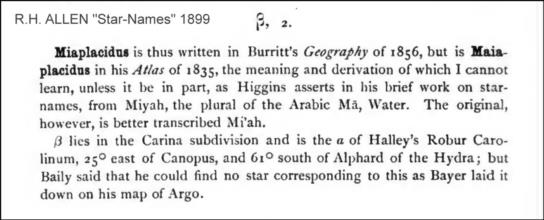
NavList:
A Community Devoted to the Preservation and Practice of Celestial Navigation and Other Methods of Traditional Wayfinding
From: Frank Reed
Date: 2022 Oct 23, 11:19 -0700
Huub Robroek, you wrote:
"The origin of the name Miaplacidus (pronunciation: /ˌmaɪəˈplæsɪdəs/) is uncertain. The name may be derived from the Arabic miyāh, meaning “waters,” and Latin placidus, meaning “placid.” "
Yes, you'll find the same in the Wikipedia article on the star with the addition of some silly hyperbole about the "great scholar" who created this etymological model. Mostly this is the lasting influence of a monograph on star names from the late 19th century, Star-Names and Their Meanings by R.H. Allen published in 1899 and available on Google Books here. This is a useful book certainly, but it has numerous incorrect etymologies and stories. It was a product of its times. It became more important thanks to a curiosity of the space age, the "Dover reprints". Dover Publishing published inexpensive reprints of numerous technical books especially related to astronomy and space-related sciences during the craze to "catch up with" the Soviets. Allen's book on star names had no direct relevance, but it was in the halo. Most astronomy fans who know Allen's book have seen the Dover reprint from 1963 originally, entitled: Star Names: Their Lore and Meaning.
In "Star Names" Allen has a brief note, image attached, on Miaplacidus crediting Burritt's "Geography" (that's Elijah Burritt's very popular and inexpensive American star atlas, "The Geography of the Heavens") and noting that the spelling was Miaplacidus by 1856 (Burrit had been dead for almost twenty years by then so Allen shouldn't really be attaching Burritt's name to that altered spelling) and Maia placidus in 1835. That's all fine, but as I have discovered and described (*), Burritt took "Maia Placidus" from Kerigan, and that pushes the date back to 1821 at least. And we still have nothing but speculation on the origin of the name despite finding it a dozen years further back in time.
Allen also mentions Higgins and his "brief work on star names". That's W.H. Higgins, lauded without citation as a "great scholar" on Wikipedia (probably an edit added by one of his descendants). Higgins, like R.H. Allen, was a minor "orientalist" with some knowledge of classical languages (Latin and Greek) and also Arabic and Persian. He apparently wrote one book, this "brief work" cited by Allen and offered up his theory that Maia meant waters from Arabic. There's no basis for this. It was just guesswork from "some guy" -- Higgins.
Frank Reed
* Incidentally, I would emphasize here that what I have described here, tracing the modern IAU-approved star name Miaplacidus back to Thomas Kerigan's celestial navigation books using the earlier form "Maia Placidus" and demonstrating that Burritt almost exactly copied his so-called "planisphere" chart from Kerigan, is new information, from my own "research", my own digging around. I had a copy of Burritt's atlas for many years, and I was always puzzled by the odd style of the planisphere chart. We know that Burritt copied the artwork in other other atlas pages from Jameson (as did also the creator of the popular constellation cards of "Urania's Mirror"), but the origin of the planisphere was previously unknown. If any of you have occasion to talk or write about this, please give credit. Thanks!







